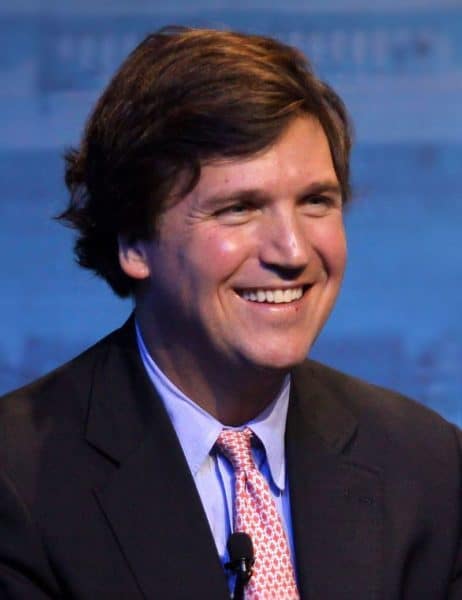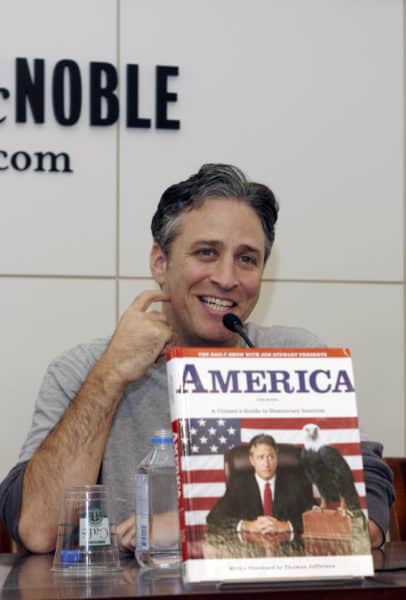Tucker Carlson’s Last Laugh
Jeb Sanderson, American Renaissance, September 23, 2017

Tucker Carlson (Credit Image: Gage Skidmore / Wikimedia)
Four years into the Bush administration, the cable news media was already growing stale. Talking heads bickered over minutia, the “war on terror” was failing, and discontent with the political status quo was festering. Apart from this was Jon Stewart, a moderately successful leftist comedian who was an emerging voice of the people. With the extremes of radical Islam and Christian fundamentalism rivaling to alienate people in the center, it was the perfect atmosphere for a moderate to achieve prominence. Mr. Stewart’s “Daily Show” helped Americans forget about the growing terror threat, disappearing prosperity, cultural erosion, and the dwindling white majority, and instead to embrace some middle ground we all supposedly share.
It was in this stultified media environment that Mr. Stewart’s was invited to appear on “Crossfire” — a show that Mr. Stewart felt represented everything wrong with the political system. “Crossfire” featured two partisans — Paul Begala representing Democrats, and Tucker Carlson representing Republicans — yelling at each other, alienating viewers, and leaving anyone watching inflamed and ready for a fight. Mr. Stewart thought of his centrism as the antidote to this polarization, and he appeared to plug his book, America: A Citizen’s Guide to Democracy Inaction.
Here is the entire exchange:
The discussion began cordially but turned hostile when Mr. Stewart shared his feelings about the show. He called Mr. Begala and Mr. Carlson “partisan hacks” who were “hurting America” with their nightly broadcast. Mr. Begala was willing to laugh off Mr. Stewart’s comments, but Mr. Carlson took offense to Mr. Stewart’s hypocrisy. Mr. Carlson brought up an interview that Mr. Stewart did with then-presidential candidate John Kerry as an example of Mr. Stewart’s obsequiousness toward liberals. Backed into a corner, Mr. Stewart claimed that as a comedian he has no responsibility for real journalism.
Although Mr. Stewart offered little in terms of substantive analysis (he stammered through some hackneyed quips, tired applause lines, and general bemoaning of the system you might expect to hear from a college-aged Marxist), this was supposedly his big shining moment. Looking back on it now, it’s hard to believe that this exchange was considered a huge victory for Mr. Stewart. Still, it marked the moment when liberal elites could snarkily declare their consensus views “above politics.” Crass and irresponsible pundits like Tucker Carlson were on the outs.
For a while, that was exactly what happened. “CrossFire” was canceled shortly after Mr. Stewart damaged its credibility. Mr. Carlson, once considered a rising star, had lost his luster. Mr. Stewart was venerated as a satirist and new-aged news man, and would become the Walter Cronkite for a generation of nihilistic millennials. Mr. Carlson would retreat to MSNBC, where he became a political eunuch, desperate to sanitize his history as a partisan blusterer. A new era of media had seemingly dawned. Mr. Stewart was putting “partisan hacks” in his crosshairs, and the public was wising up to the inanity of cable news. What would result was a new golden age of understanding led by Mr. Stewart and other leftist truth-tellers of the new-and-improved Fourth Estate, right?

Jon Stewart in 2004. (Credit Image: Melissa Lynn / ZUMAPRESS.com)
Not quite. Mr. Stewart would eventually be exposed as more disingenuous than any of the easy targets he ridiculed. During the 2008 presidential primary, Mr. Stewart threw his crucial influence behind Barack Obama. Mr. Obama coasted into the oval office thanks to the image impressed upon him by Mr. Stewart and his fellow liberals, who saw Mr. Obama as a mulatto soothsayer whose coronation would redeem white guilt. In their blind support for Mr. Obama, liberals would go on to betray their roots and spur the creation of a new, enraged, anti-establishment Right. This shift would offer a new opportunity for Tucker Carlson, who had regained his bearings after launching his online magazine, The Daily Caller, and found his way to FOX News.
Mr. Carlson’s rise to the top of the cable news hierarchy came just as unexpectedly as Mr. Stewart’s. It came during an unprecedented purge of conservatives from the FOX News Network. In a matter of months, Bill O’Reilly, Roger Ailes, Eric Bolling, Greta Van Susteren, and several others were fired or departed from the network under bizarre circumstances. This turmoil allowed Mr. Carlson, formerly a contributor and occasional guest host, to finally receive his own one-hour show where he was able to showcase his incisive rhetorical style. No longer sporting his once-signature bow tie, Mr. Carlson has matured into a brutal yet eloquent debater, often bewildering his opponents in memorable ways. The ratings for “Tucker Carlson Tonight” have remained formidable, and he has become the cornerstone of the network.
Taking over Bill O’Reilly’s 8 pm time slot, Mr. Carlson has revamped his predecessor’s “No Spin Zone” for the Trump era. Whereas Mr. O’Reilly would attempt to bully his guests into accepting milquetoast establishment opinions, Mr. Carlson actually broaches taboo subjects with refreshing candor. While he has kept his biting “CrossFire” style intact, Mr. Carlson has shed much of the hyper-partisanship that defined his earlier career. No longer having to play that role, Mr. Carlson has hit targets across the board. During one week, he reduced to near tears both a neocon retired lieutenant and a Council on Foreign Relations stooge, before sharing jovial words with a far leftist about the folly of anti-Trump hysteria regarding Russia. Of course, he spends the majority of his time debunking the Trump era’s bountiful left-wing histrionics.
Meanwhile, Mr. Stewart has retired. Having already achieved his political revolution, he has nothing else left to accomplish. He was given a fawning farewell by his fans, but as one of the influences most responsible for putting Mr. Obama into office, Mr. Stewart is far from a hero. The most authoritarian and unconstitutional policies of the Bush era were expanded under Obama’s rule, and the promise of a “post-racial America” proved to be a cruel deception. Mr. Stewart’s routine grew stale as soon as Mr. Bush left office. He transformed from the snarky voice of dissent to the accommodating propaganda organ of the new liberal flavor of authoritarianism. This change happened almost overnight, and it caused Mr. Stewart to lose the credibility he amassed during the Bush years. Mr. Stewart became everything he once hated.
Mr. Stewart’s legacy endures. There are his clones — such as Samantha Bee, John Oliver, or his affirmative action replacement Trevor Noah — and he has certainly carved out a niche for this brand of liberal satire, but it is not driving politics like it once was, as evidence by his stand-ins’ inability to put even a chink in Trump’s armor during the election season. The Jon Stewart of the mid-2000s could have shaken a man of Trump’s stature, but his replacements are good only for blooper reels mocking their futility and ineptitude.
The days when the establishment could limit access to information are over. Media has been effectively democratized, and while this was a liberal fantasy for generations, the actual results jeopardize their influence. Although they like to pretend otherwise, leftist power was always derived from institutions like the mass media, the university system, the federal government, and Hollywood. With those institutions being undermined assiduously in the digital age, leftists are steadily losing influence.
Instead of having to wait until prime time to watch some dramatic arguments or take-downs, people can now watch them any time on their Twitter feeds or even engage in them personally. The barrier of entry for being a public commenter has been removed completely. A random schlub with no experience, no credentials, and no formal training in journalism can post a tweet and have it reach more people than any cable news show. This is a tremendous power-grab for the ordinary individual, and that power is being yanked from Jon Stewart and his ilk. Wise cracks from someone like Mr. Stewart were once seen as a novelty, but now anyone with a modem can get in on it. Competition has made Mr. Stewart’s act obsolete, and now zany personalities with pen names like “Baked Alaska” are filling his void.
Men like Donald Trump, Tucker Carlson, Alex Jones, Steve Bannon, and the unfiltered personalities of the alt-right dominate today’s media landscape. The media revolution that Mr. Stewart demanded for so many years has come, but he finds himself on the losing end of it. There is no longer a market for comedians posing as journalists delivering cutesy one-liners shrouded in a facade of high-mindedness. What is fashionable right now is the uncensored truth delivered through the course of tense confrontations. No middle ground is ever going to be established at this point; that ship has sailed. There is going to be a winner, and there is going to be a loser. Mr. Carlson is fighting to win, and people are responding. The public no longer wants white commentators too sheepish to defend their values against the aggressive, advancing enemy. If Mr. Carlson continues down this path and refuses to falter as the pressure grows, he will be remembered as a hero for many generations to come — while Mr. Stewart will remain a footnote.















